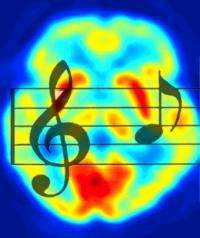Research reveals the biochemical connection between music and emotion

You are in a concert hall, listening to music you love, Ludwig von Beethoven's Ninth Symphony. You are happily awaiting the glorious climax in the fourth movement -- you know it's coming -- when the full orchestra and chorus erupt with the "Ode to Joy." The moment is here and you are exhilarated, awash in a sudden wave of pleasure.
When music sounds this good, there's a reason: dopamine.
In research published in the journal Nature Neuroscience, scientists at McGill University in Montreal have established the direct link between the elation stimulated by music and the neurotransmitter dopamine. Dopamine is the same substance that puts the joy in sex, the thrill in certain illegal drugs, and the warm feeling within a woman breast-feeding her child.
The substance also may explain why the power of music crosses human cultures, the scientists said.
Valorie N. Salimpoor and other researchers in the lab of Robert J. Zatorre took eight subjects and asked them to bring in music they loved. They chose a broad range of instrumental music, from Samuel Barber's Adagio for Strings (the most popular) to jazz and punk. The test used only familiar music, Zatorre said, because he wanted to make sure he was getting a "maximal response."
What the subjects had in common was that the music they brought in gave them the "chills," which is actually a technical term for a kind of emotional response. A positron emission tomography, or PET scan, measured dopamine release.
Dopamine is synthesized in the brain out of amino acids and transmits signals from one neuron to another through the circuits of the brain.
The structure in the brain Zatorre's team looked at is the striatum, deep inside the forebrain. The striatum has two subparts: the upper, or dorsal, and the ventral below.
Zatorre said the dorsal part of the striatum is connected to the regions of the brain involved in prediction and action, while the ventral is connected to the limbic system, the most primitive and ancient part of the brain, where emotions come from. "When you are anticipating, you are engaging the prediction part of the brain; when you feel the chills, that's emotion," Zatorre said, whose team found that the dopamine triggered both parts.
According to the McGill research, during the anticipation phase dopamine pours into the dorsal striatum when the climax occurs, triggering a reaction in the ventral striatum that results in a release of pure emotion.
The idea that there was some biochemical reaction involved goes back to the work of the late Leonard B. Meyer in the 1950s. Meyer was a musicologist not a scientist, but he connected music theory with psychology and neuroscience, emotional response to music patterns. He did not know the biochemical mechanism.
Great composers don't know it either but play on this process. German composer Gustav Mahler is famous for creating tension that needs resolution, building intensity until the orchestra explodes in a wave of sound. The listener knows there is going to be an emotional resolution even if the piece is unfamiliar. And, if the listener knows it is coming, the reaction can be even more intense. It turns out, said Zatorre, that Mahler -- and conductors performing his music -- play with the emotions of the audience by manipulating dopamine.
"What we're finding is that this is the brain mechanism that underlies this phenomenon," Zatorre said.
Zatorre hypothesizes that something similar happens when you hear music for the first time, and preliminary results from recent testing show a similar result. The universal structures of music can produce dopamine-induced anticipation and release even if the music is unfamiliar.
According to Sharon Levy, who teaches music theory and piano literature at the Juilliard School in New York and the Peabody Institute at Johns Hopkins University in Baltimore, sometimes the emotional release comes from simply relieving harmonic tension -- the use of relatively dissonant chords begging to be resolved -- as Mahler does. On occasion the composer deliberately changes expectation in happy, surprising ways, a device Meyer wrote that Mozart had mastered. Either way, it's dopamine affecting the striatum.
Zatorre said he does not know what is happening in the brain of the composer who is writing the music.
"My guess is that composing is such a complex act that you may not get that emotional touch until later when you are actually experiencing it for the first time," Zatorre said.
The question is will knowing the role of dopamine change the way musicians approach their art?
"Not much," said Levy. "It just reminds me of something I knew all the time, that music can change moods."
Zatorre used orchestral music to avoid having emotions linked to words affect the results. He is planning another study using vocal music, perhaps to see whether Lady Gaga or Frank Sinatra can turn on the dopamine.
More information: Paper online: www.nature.com/neuro/journal/v … nt/full/nn.2726.html













